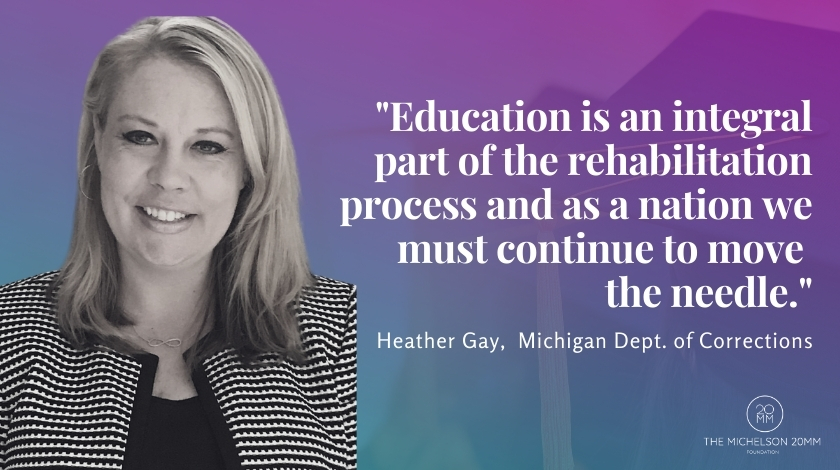Higher educational programs in prisons decrease recidivism by 13%, while also resulting in a $1:$5 return on investment for taxpayers. As the reinstatement of Pell Grants increase the prevalence of college programs in prisons, there is a great need to ensure the programs offered are high quality, both in terms of their curriculum and their support, as a recently published RAND Corporation guide for corrections officials highlights.
On September 16th, 2021, the Michelson 20MM Foundation and RAND Corporation aim to bring that guide to life by hosting, “College Education in Prison: A How-To Guide for Corrections Officials,” an event that features nationally recognized experts as they break down the basics of starting prison college programs. One of our distinguished panelists include Heather Gay, education manager at the Michigan Department of Corrections and president-elect of the Correctional Education Association (CEA). Gay, who also served as a reviewer of RAND’s guide, discusses the importance of this resource for corrections officials.
1. As the co-author of the guide Lois Davis writes, too little has been written from the perspective of what correctional leaders themselves need to know. How does the RAND guidebook address that issue? How is it different from the literature that already exists around implementation of higher education programming in prison?
The RAND guidebook provides direction and guidance specifically for corrections officials. Often, literature is written from the perspective of what should happen or can happen from no one that has worked inside prison; the guidebook captures how to make it happen in practical terms. Additionally, this publication also lends itself to marrying the concept of post-secondary education to the overall goal and mission of corrections institutions.
2. Why is this guidebook a valuable tool for corrections leaders and how will they benefit?
This guidebook has immense value. Corrections leaders over the past 25 years have not had the ability on a widespread basis to choose post-secondary education as part of the rehabilitation formula, there just was not enough access. This guidebook is a great resource and addresses everything one needs to know. I also think [Lois Davis] does an exceptional job of giving the non-correctional stakeholder perspective on what starting a program in prison takes. The guidebook also helps one understand the structure of colleges, this will be very helpful as well.
3. What do you hope that readers of the guidebook will take away and learn?
My hope is that all stakeholders will realize we all want the same thing. By partnering and moving in the same direction, the impact will be great. Education is an integral part of the rehabilitation process and as a nation we must continue to move the needle.
Join the conversation and register for “College Education in Prisons: A How-To Guide for Corrections Officials,” September 16, 2021, at 11:00 AM PST.
Michelson 20MM is a private, nonprofit foundation seeking to accelerate progress towards a more just world through grantmaking, operating programs, and impact investing. Co-chaired and funded by Alya and Gary Michelson, Michelson 20MM is part of the Michelson Philanthropies network of foundations.

